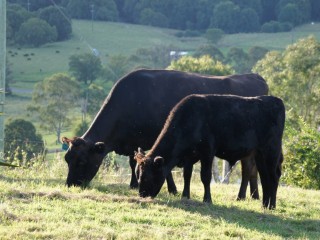 Wagyu cattle breeders across Australia appear to be marshalling their resources in preparation for a renewed growth phase.
Wagyu cattle breeders across Australia appear to be marshalling their resources in preparation for a renewed growth phase.
Nationwide, more than 90,000 females will be joined this year to Wagyu bulls, either naturally, through AI or ET, a recent survey conducted by the Australian Wagyu Association suggests.
The survey also indicates that breeders (producing all descriptions from F1 to Fullblood Wagyu calves) plan to increase joinings by 13 percent in 2012, compared with this year. The two-year comparison projecting out to 2013 is even greater, with a surprising 24pc increase in matings forecast.
If it proves accurate, such a rise could spark a significant jump in demand for quality Fullblood Wagyu herd bulls to deliver the result.
The AWA forecast is made on the assumption of prevailing weather and market conditions continuing, although to be fair the A$ has already risen 5pc since the survey was conducted.
After a decade of solid growth in numbers since the Wagyu breed’s foundation in Australia, there was a noticeable check in production as the Global Financial Crisis set in from late 2008.
The industry was hit hard by the GFC, as ‘premium’ consumer products in general, and high-priced restaurant meals in particular, were struck off the expenditure list.
There was evidence in early 2010 of Wagyu F1 calves, in some cases attracting no premium over Angus whatsoever. In some examples they were sold through saleyards as ‘Angus cross,’ so low had the marketing cachet of the breed identity declined. But that turned around strongly later in 2010, with clear premiums again evident for well-bred F1 feeder calves.
The GFC impact was clearly evident in Wagyu cattle numbers on feed surveys done with more than 30 commercial feedlots holding Wagyu inventory in early 2007, and again in early 2009.
Numbers on feed hit a peak in the January 2007 survey at 61,300 head, before declining by almost 20pc to 50,018 in the same survey in 2009. If it had been held a year later, the result would probably have been worse still.
While critics might say the latest AWA Wagyu joining survey represents more of a ‘wish list’ than any tangible evidence of fact, it does clearly signal that Wagyu breeders are again in a mood for growth.
Two opposing trends are evident among the crossbred (F1-F3) Wagyu population. Some producers are not crossing beyond F1, based on insufficient premiums being offered for F2 and F3 cattle to justify the additional production costs involved.
However progression from F1 through to F3 and beyond is continuing in other herds which appear to be moving to purebred production. Overall, between 2011 and 2013, respondents indicated no change in F1 joining numbers; a 61pc rise in F2 numbers; 51pc rise for F3; and a 37pc rise for purebred.
Fullblood matings to rise 50pc
Fullblood joinings (100pc imported Japanese genetics on both sire and dam side) are forecast to rise by 50pc, but this is coming off a low base, as these animals typically represent only 5-7pc of all Wagyu cattle produced in Australia.
Overall, 44 percent of respondents to the survey have some fullblood females within their herds, but these will comprise only 11pc of all females to be joined this year.
The respondents’ herds made up of Fullbloods currently average 250 joinings each year, but showed an incredible range from two females to 2000. Respondents’ purebred herds average 800 joinings, while crossbred herds average almost 2000 joinings, and included several with more than 10,000 joinings each year.
Of the 90,000 females to be mated to Wagyu Australia-wide this year, less than 30pc will comprise Fullblood or Purebred females.
Growth predictions for beef production, as distinct from joinings, suggest annual increases of 10pc for both 2012 and again in 2013. Fullbloods should continue to grow, representing 8.5pc of total feeder animals in 2013.
